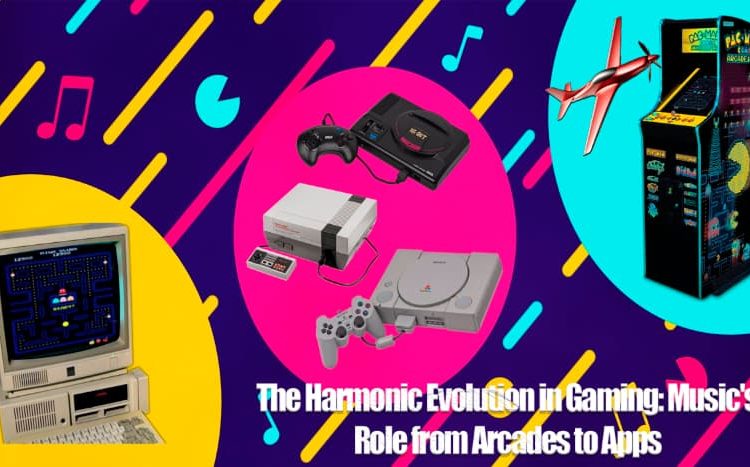Music has metamorphosed throughout the gaming industry, from simple tracks that looped in early arcade games to elaborate orchestral scores in today’s PC and mobile gaming platforms. This transformation has turned music into a background element of game playing into a major part of the experience, enhancing characters’ stories, immersing players and drawing emotions. In this exploration, we shall see how music is not just accompanying but forming a core part of video games’ content, indicative of changes in technology and innovation in visual arts.
From 8-bit Tunes to Orchestras: Charting the History of Game Music
The development of game music historically refers to a transition starting from simple 8-bit tunes created within the span of the 1980s to complicated orchestral motifs defining the current times. Initially, composers were limited by technical capacities to only beeps and tunes such as those found on “Pac-Man” or “Tetris.”
The introduction of MIDI technology resulted in more complex compositions; for example, the “Final Fantasy” series was responsible for deeper narratives with its music. Full orchestras became an essential factor when developers wanted their audiences to become fully absorbed into their virtual reality, some examples include The Elder Scrolls: Skyrim.
These milestones underscore the integral role of music in enhancing gameplay, storytelling, and player immersion, reflecting the industry’s technological advancements and growing recognition of composers’ artistry.
Silence Speaks: The Unique Approach of Aviator by Spribe
Aviator has been designed by Spribe to have no sound of music, simple and focused. This is a part of its design concept, which focuses on simplicity. This type of silence is intended to extract the most out of players when they are going up or down with their aviators. In other words, ‘Aviator’ eliminates music from the game; thus shifting the emphasis on the auditory elements onto the player’s actions and mechanics, leading to a unique and immersive experience.
The aforementioned approach implies that game creators decided to include as few details as possible for gamers so that they could express themselves about what was happening in gameplay, without being influenced by a background track, making it possible to make online betting more personal and emotional.
Amplifying the Game: How Music Elevates Player Experience
One major benefit comes with the incorporation of music into games; this makes gaming much better than before. In this case, soundtracks make the gaming process both interactive and realistic, since they create environments for players where gamblers enter real worlds. It also helps build up game scripts such that characters become more realistic, thus appealing to more emotions towards them.
This is the bond between music and video games that further defines player engagement, providing memorable experiences beyond the screen, and exhibiting how music can magnify the artistry and impact of video games.
The Psychology of Sound: Music’s Emotional Resonance in Gaming
Music in a game works deeply on the psychology of a person as it greatly affects their emotional responses, moods, and levels of engagement. Employing good music can make a player feel a whole range of emotions, from tension during battle scenes to tranquillity within peaceful environments; thus having direct psychological effects on players’ minds while playing. These heightened moments make success more rewarding and loss more devastating. The use of music in strategy enhances storytelling by making such narratives more vivid and lasting.
- Enhanced Emotionality: Music heightens emotionality across various game elements, as illustrated by exciting victories or dramatic defeats.
- Mood Optimization: Background tracks may have a calming or energizing influence over gamers, affecting their overall experience.
- Involvement and Absorption: Immersion into gaming realities is accompanied by an appropriate soundtrack, which creates deeper involvement for players.
- Behaviourism: Some rhythms or musical motifs may affect player decisions and strategies, giving a clue for what to do next in terms of gameplay.
Music in video games does more than enrich the gaming experience, as it also epitomizes a crucial aspect of marketing and branding strategies that improve brand identity and recall. This has been exemplified by the world-famous themes from games like “Super Mario Bros.” and “The Legend of Zelda” which have gone beyond gameplay to form part of Nintendo’s brand identity.
The haunting soundtracks of Halo have played a vital role in its promotion, thus confirming the epic scope and immersive nature of the franchise. Consequently, these musical trademarks do not just amplify the game but also kindle strong bonds with audiences displaying music’s capacity to embody or elevate any given game’s brand essence within a competitive industry.
Composing the Future: Innovative Trends in Video Game Music
Emerging technologies, genres, and creative approaches are influencing current trends and shaping future innovations in video game music. Adaptive music technology is increasingly becoming more advanced, resulting in personalized gaming experiences where music changes according to player actions.
Additionally, the blending of various musical genres, from electronic to traditional orchestral, reflects the industry’s growing diversity. Virtual reality games are also pushing composers to explore spatial audio, creating immersive soundscapes that envelop the player. These advancements promise a future where game music not only enhances gameplay but also becomes an even more integral part of the gaming narrative and experience.

